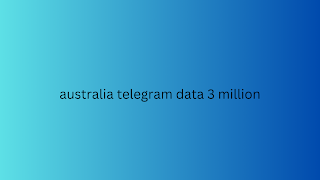4. Identity control and blockchain of course
Posted: Sat Dec 21, 2024 3:20 am
2. Pay automatically (and on time)
With today’s technology, many markets are seeing breakthroughs in automation. Systems are also becoming increasingly smarter, powered by artificial intelligence and natural language processing , for example , to further close the communication barrier between humans and machines.
Gobbil
In fintech, it is no different. There are many start-ups (such as the Australian Gobbill ) working on automating payments and solving the problem of 'not paying on time', so that we as consumers deal with liquidity as smartly as companies do. Paying an outstanding bill too late will hardly happen; automated and optimally timed payments are the future.
Forbes also sees this development as one of the trends of this year . The company mentions automatic investing as a possible outcome of this trend. At the moment, this seems to be reserved mainly for people who invest professionally, but with the arrival of so much technology, this could change quickly. We also see this in the development that I will zoom in on below.
3. Financial planning
Even a step further than paying bills on time is smart financial planning. Where we have already encountered many initiatives that solve a specific component (such as Peaks does with automatic change investing), the expectation is that this will be extended even further. In this way, we can set up every component of our finances with an eye to the future (and also automate it again).
Pefin & Peaks
One of my favorite examples of this is Pefin . A digital assistant , powered by artificial intelligence, that helps coordinate all your income and expenses and set up your financial future. Where the dynamic market constantly ensures adjustments to be able to continue to achieve those goals. At the moment not officially in the Netherlands, but can still be used.
Also read: Innovation in fintech: working australia telegram data 3 million together on ultimate relevance for your customer
For me, personal financial planning is a very concrete playing field that I want to see more of in the near future. With current technology, it should be possible to translate what we 'receive' as efficiently as possible into processing accounts, investments, and savings goals. This also based on an ever-changing need without losing sight of the bigger picture - in which automation / AI can of course play a nice role.

Photo: Peaks
Services like Peaks and Pefin are a great first step, but I hope (and believe) that much more will happen in the field of financial planning. Also to create more awareness around the risk of financial problems, for example from the government or banks.
Blockchain is one of the magic words in fintech at the moment. But it is much more interesting to see what kind of applications we are going to design with it – and use en masse.
With today’s technology, many markets are seeing breakthroughs in automation. Systems are also becoming increasingly smarter, powered by artificial intelligence and natural language processing , for example , to further close the communication barrier between humans and machines.
Gobbil
In fintech, it is no different. There are many start-ups (such as the Australian Gobbill ) working on automating payments and solving the problem of 'not paying on time', so that we as consumers deal with liquidity as smartly as companies do. Paying an outstanding bill too late will hardly happen; automated and optimally timed payments are the future.
Forbes also sees this development as one of the trends of this year . The company mentions automatic investing as a possible outcome of this trend. At the moment, this seems to be reserved mainly for people who invest professionally, but with the arrival of so much technology, this could change quickly. We also see this in the development that I will zoom in on below.
3. Financial planning
Even a step further than paying bills on time is smart financial planning. Where we have already encountered many initiatives that solve a specific component (such as Peaks does with automatic change investing), the expectation is that this will be extended even further. In this way, we can set up every component of our finances with an eye to the future (and also automate it again).
Pefin & Peaks
One of my favorite examples of this is Pefin . A digital assistant , powered by artificial intelligence, that helps coordinate all your income and expenses and set up your financial future. Where the dynamic market constantly ensures adjustments to be able to continue to achieve those goals. At the moment not officially in the Netherlands, but can still be used.
Also read: Innovation in fintech: working australia telegram data 3 million together on ultimate relevance for your customer
For me, personal financial planning is a very concrete playing field that I want to see more of in the near future. With current technology, it should be possible to translate what we 'receive' as efficiently as possible into processing accounts, investments, and savings goals. This also based on an ever-changing need without losing sight of the bigger picture - in which automation / AI can of course play a nice role.

Photo: Peaks
Services like Peaks and Pefin are a great first step, but I hope (and believe) that much more will happen in the field of financial planning. Also to create more awareness around the risk of financial problems, for example from the government or banks.
Blockchain is one of the magic words in fintech at the moment. But it is much more interesting to see what kind of applications we are going to design with it – and use en masse.